- Home
- Martin Cruz Smith
Three Stations Page 2
Three Stations Read online
Page 2
Her name was Anya Rudikova. Oddly enough, he saw her a week later on television, black eye and all, discussing violence in film with the objectivity of a sociologist.
The radio dispatcher called and Arkady picked up on Victor’s behalf.
“Orlov.”
The dispatcher was cautious. She demanded to know whether he was fit for duty.
“Yes,” Arkady said.
“Because when you called earlier you didn’t sound so good. People are talking about you.”
“Fuck them.”
“Well, you do sound better. Can you handle an overdose? The ambulances are running late.”
“Where?”
While Arkady listened he executed a satisfying U-turn in the face of oncoming traffic.
What tourist maps called Komsomol Square, the people of Moscow called Three Stations for the railway terminals gathered there. Plus the converging forces of two Metro lines and ten lanes of traffic. Passengers pushed their way like badly organized armies through street vendors selling flowers, embroidered shirts, shirts with Putin, shirts with Che, CDs, DVDs, fur hats, posters, nesting dolls, war medals and Soviet kitsch.
During the day Three Stations was in constant motion, a Circus Maximus with cars. At night, however, when the crowds were gone and the square was floodlit and gauzy with insects, Arkady felt that the stations were as exotic as opera sets. Leningrad Station was a Venetian palace, Kazansky Station was an Oriental mosque and Yaroslavl Station wore a clown’s face and cap. The night revealed a population that the daytime bustle had obscured: pickpockets, flyboys handing out directions to strip clubs and slot arcades, gangs of street kids looking for the wounded, the slow, the easy mark. Men with vague intentions idled in small groups, beers in hand, watching prostitutes grind by. The women walked with a predatory eye and looked as likely to eat their clients as have sex with them.
Drunks were everywhere, but hard to see because they were as gray as the pavement they sprawled on. They were bandaged or bloody or on crutches like casualties of war. Every doorway had a resident or two; they might be homeless but Three Stations was their roost. A beggar with broad shoulders and withered legs propelled his cart past a Gypsy who absentmindedly pulled out her baby and her breast. At Three Stations the crippled, outcast and usually hidden members of society gathered like the Court of Miracles only without the miracles.
Arkady jumped the curb at Yaroslavl Station and rolled across a small plaza to a workers’ trailer that had stood in place so long its tires had deflated.
He asked Victor, “Do you want to stay in the car? I can cover for you.”
“Duty calls. Someone may be pissing on my crime scene. Piss on a man’s crime scene and you piss on the man himself.”
Workers’ trailers provided basic on-site accommodations: four bunk beds and a stove, but no toilet, shower or a/c. They baked in the summer and froze in the winter and from the outside the only concessions to human habitation was a sliding window and a door. After all, the workers were generally migrant labor from Central Asia. Tajiks, Uzbeks, Kirks, Kazakhs, although Russians tended to call them all Tajiks.
Russians were the actors, Tajiks the necessary but unseen stagehands who did the work too miserable or too dangerous for any local boy to consider.
Victor and Arkady were admitted by a railway police captain named Kol. The captain was cutting a raw onion and eating the slices against a summer cold. He wiped away tears.
“A lot of fuss for a dead whore.”
The trailer’s wiring had been ripped out but an extension cord entered through a window and ran to the ceiling hook, where a bare lightbulb cast a watery glow. The back of the trailer resembled the bottom of a trash barrel: hamburger wrappers, empty soda cans, broken glass and, on a lower bunk, a woman faceup and eyes open on a dirty mattress. Arkady guessed that she was eighteen or nineteen years old, fair-skinned. Soft brown hair and light blue eyes. She wore a cheap quilted jacket trimmed in synthetic “fur.” One arm was raised as if making a toast. The other was tucked into her waist.
From the waist down, she was nude, legs crossed, and on the inside of her left hip the tattoo of a butterfly, a favorite motif among prostitutes. A half-empty liter of vodka stood on the floor next to a denim skirt, underpants and shiny high-heeled boots. Arkady would have covered her but the rule was no touching until the forensic technicians had finished.
Scattered on the mattress were a black patent-leather handbag, lipstick, rouge, hairbrush, douche, toothpaste and toothbrush, tissue, pepper spray and an open bottle of aspirin. Yellow powder spilled from the bottle. What Arkady did not find was an ID.
Kol took a position inside the trailer door. Hash and heroin flowed through Three Stations and relations between the militia and railway police was a truce between thieves.
Victor asked, “Who found the body?”
The captain said, “I don’t know. We got a call from someone passing through.”
“How many is that?”
“People passing through Three Stations on an average day? About a million. I don’t remember every face.”
“Do you remember her?”
“No, that tattoo I’d remember.” Kol couldn’t take his eyes off it.
Arkady asked, “Who put the trailer here?”
“How should I know?”
“Nice knife.”
“It’s sharp enough.”
Apart from the fact that the woman was dead, she seemed in good health. Arkady saw no obvious cuts or bruises. From her temperature, muscle tone and the absence of lividity—the purple stripes of pooled blood—he guessed that she was dead no more than two hours. He played the beam of a penlight on blue irises gone slack. There was no bleeding in the corneas or any other indication of head trauma. No roseate nose, raw cheeks or needle tracks. Her forearms and hands presented no defensive wounds or scraped knuckles and there was grime but no scratched tissue under her fingernails. It was as if she had slept through her death.
Victor came to life; murder always did that for him. The forensics van would generate photographs he could circulate among streetwalkers, kiosk clerks and other nighttime regulars. Arkady took a short stroll around the trailer looking for items of clothing that might have been dropped, but the streetlamps in back of the square were so few and so dim it was like wading through water. The apartment building opposite Yaroslavl Station could have been a distant planet. Even prostitutes hesitated to enter some corners.
Of course, there were prostitutes and prostitutes. Exotic beauties at expensive clubs like Night Flight or the Nijinsky demanded $1,000 a night. At the bar of the Savoy Hotel, $750. Room service at the National Hotel, $300. An all-night Thai masseuse, $150. Oral sex in Lubyanka Square, $10. Three Stations, $5. It was a wonder the captain hadn’t scraped her up with a shovel.
Victor took a call on the car phone, saying only, “Yes… yes… yes” until he clicked off.
“Petrovka demands to know what I’ve got. Homicide, suicide, accident, overdose or natural causes? If I don’t have evidence of deliberate foul play, they want me to move on. The ambulance will come when it comes. Some oligarch lost his little dog in a garage. Petrovka wants me to go there, get on my hands and knees and help find the little puppy. If I find it first I will twist its furry head off.”
“You’d leave before the technicians get here?”
“If she’s an accident or natural causes, there won’t be any forensic technicians or autopsy. They’ll collect her, and if she goes unclaimed for a week, she’ll go to the medical school or up in smoke.” Victor squinted to get a thought in focus. “All I know is that she was dealing with a perverse individual. Nobody leaves half a liter of good vodka with the cap off.”
“Your point being… ?”
“He could afford another bottle. He had money.”
“And this wealthy individual chose to have sex on a dirty mattress in a trailer?”
“It wasn’t in the street. And then there’s the butterfly tattoo. That’s an identificati
on plus.”
Captain Kol was slicing the onion with his eyes fixed on the girl when he exploded with “Fuck!” He had cut himself and blood ran from his onion to his elbow. “Shit!”
“No bleeding, pissing or picking your nose around my crime scene.” Victor launched the captain out of the trailer. “Cretin!”
She didn’t look like a homicide, suicide or OD to Arkady. No sedatives, no needle tracks or peg teeth of a methadone user.
“What’s that?” Victor noticed the open aspirin bottle and yellow powder.
“We’ll have to wait for the lab to tell us.”
Victor licked a gloved fingertip, dipped it in the bottle and came up with a dab of powder that he smelled, tasted and spat out like a wine expert dismissing an inferior Bordeaux.
“Clonidine. Blood pressure pills. Want a taste?”
“I’ll take your word for it.”
“A cocktail of clonidine and vodka would drop Rambo in his tracks.” Victor warmed to the thought. “Rambo would wake up with no money, no clothes, no bow and arrow, and now we have a case. Madame Butterfly here had the criminal intention and the means of rendering some innocent man unconscious and robbing him.”
Arkady shook his head. “‘Madame Butterfly’?”
“Well, we have to call her something. I’m not going to spend the night saying ‘the deceased.’”
“Anything but Butterfly.”
“Okay. There are so many Russian prostitutes in Italy that the new word for whore there is ‘Natasha.’”
Arkady said, “That would presume she was a prostitute. It would affect our attitude.”
“Never mind the trailer, the sex, the drugs. Do you prefer Princess Anastasia? Olga? There’s a name you trust.”
“What does she look like?”
Victor brushed a fly from her ear. “To me she looks like—apart from the makeup and skimpy clothing—a nice country girl.”
“I agree. Olga.”
“Good. I’m worn-out and we’ve hardly started.”
“The problem is that Olga screwed up with the knockout drops. Or this guy saw what she was up to and switched glasses when her back was turned. Maybe he spiked her glass even more. She passed out. He robbed her and took off.”
“Another problem,” Arkady said. “There are no glasses—”
“We can always get new glasses and rub a little sleep dust on her lips. Otherwise, they’ll bag our Olga and dump her and no one will notice or care. She’ll sink without a fucking ripple. I’m not saying we should come to any conclusions, just keep an open mind.”
There was an almost gawky quality to the girl, as if she had not yet grown into her long legs. Her knees were dirty but not scabbed. Arkady wondered what she would look like if her face were washed.
Victor studied the vodka bottle. Half empty or half full, the bottle had a silvery allure. Neither man had touched it for fear of smearing prints. Arkady heard the detective’s dry swallow.
“You know what’s tragic about all the money floating around?” Victor said.
“What’s tragic?”
“A bottle of vodka used to cost ten rubles, just the right sum for three people to share. Not too much, not too little. That was how you met people and made friends. Now they have money they got selfish. Nobody shares. It’s torn apart the fabric of society.” Victor raised his head. “There’s not a scratch on her. You fished me out of the drunk tank for nothing.”
“Probably.”
Victor said, “Why don’t you come with me to the garage? The dog’s name is Fuck Off.”
“We need a witness or, at the very least, her pimp. Fortunately the pimp is near.”
“Where?”
Arkady ran his finger along the extension cord from the lightbulb to the window. “At the other end of this.”
While Victor went out Arkady stayed in the trailer with the dead girl and the bottle of vodka. Contract killings aside, four out of every five violent crimes involved vodka. Vodka faithfully attended every human activity: seduction, matrimony, celebration and, definitely, murder.
Sometimes a scene told a story in dramatic terms: a kitchen table with so many beer and vodka bottles there was hardly room to set a glass, knives on the floor, blood smeared the length of the hall to two bodies, one crisscrossed with stab wounds and the other peppered with bullet holes. In comparison the trailer scene was a still life, horizontal, nothing left standing but the bottle.
Arkady was aware that he was missing something profoundly obvious, some basic contradiction. Now when he needed imagination all he could summon was Victor’s story about the wayward swimmer and the dolphins. Arkady felt his own invisible dolphins pushing him out to sea and away from land.
He sat on the bunk opposite the dead girl. She had an oval Slavic face that was more soulful than that of Western women and her hair was not simply brown but a dove’s mix of ash and brown. Her gaze was averted from the grossness of her pose. Pale bands on her fingers showed where rings had been removed, not forcibly; there was no bruising of the joints. He saw no sign on her of violence new or old, but given the choice between investigating the murder of a streetwalker or writing her off as a “death by natural causes,” Petrovka would happily accept the proposition that a young woman in apparent good health had undressed, lain down for sex in a trailer and peacefully expired. Finis!
Arkady lifted the vodka bottle off the floor by its bottom edge and stopper. A circle of water marked the floor where the bottle had been. Then something fell from the bottom of the bottle to his feet and he picked up a silver plastic card that said in black script, Your VIP pass to the Nijinsky Luxury Fair. The reverse side had a bar code and June 30–July 3, Club Nijinsky, Browsing begins at 8 p.m.
June 30 was two hours ago. Arkady went to the window. Finding a witness among the furtive citizens of Three Stations promised to be a farce. In this particular place who would notice a prostitute practicing her trade? His eye ran to the apartment house across the plaza. Eight stories mainly of dark flats, but some with kitchen lights on or the hypnotic glow of television on the ceiling. The trailer door opened and Victor was back, saturnine and triumphant.
“You’ll never guess.”
“Surprise me,” Arkady said.
“Okay. Our extension cord runs from here and goes directly to the railway police station. I saw our friend the captain through a window. He’s got a bandage on his hand the size of a boxing glove. But the cord doesn’t end there; it’s connected to another long cord that’s plugged into an outlet at the back of the militia station. Got it? We’re the pimps. You don’t look surprised.”
3
So far as Zhenya was concerned, Yaroslavl Station offered just about everything: buffets, bookstore, kiddy corner, shops selling cigarette lighters, CDs and DVDs. A lounge for soldiers; men on leave traveled free. An escalator led to an upper waiting hall that featured a concert piano behind a red velvet rope.
He started on the main floor and watched for anyone willing to play a friendly game of chess on the folding board he had in his backpack. He was cautious; he always carried his ID and a commuter pass in case he was stopped. Although he was half hidden in a sweatshirt and hood, he stayed in the blind spots of ceiling cameras focused on him.
When he didn’t see a likely opponent, Zhenya retreated to a bench on a quiet corridor off the upper hall and studied a pocket English-Russian dictionary. Bobby Fischer had learned Russian to read proper chess analysis; Zhenya was returning the favor. Zhenya concentrated on the talented word “draw,” which described the inconclusive ending of a chess match. Or pulling, pouring, sketching, attracting, earning, opening or closing drapes and more.
With a click the door across from Zhenya opened. Inside, two militia officers and a girl sat at a metal table with a plastic pitcher of water, paper cups and a tape recorder. The senior officer was a woman, a major by the stars on her shoulder boards. A lieutenant tipped back in his chair.
The girl was about fifteen, Zhenya’s age. Her eyes were b
lurred by tears, and since she had dyed her hair a neon red, she was exactly the type the militia liked to harass, but the major used a motherly tone.
“First necessary information and then the search. Everything will turn out fine. Maybe someone will find your lost baby before we’re even done.”
“I didn’t lose her, she was stolen.”
“So you said. We’ll get into that.”
“We’re wasting time. Why aren’t you looking for her?”
“My dear, we have a systematic approach that works well. This is a problematic case. You say that you don’t have any photographs of the baby.”
“A baby is a baby.”
“Still it is a shame. A photograph is crucial in finding someone.”
“Did you find them?” The girl pointed to the faces pinned to the wall, black-and-white photocopies of snapshots grainy from enlargement, taken indoors or out, of different ages and either sex but the people in them had one thing in common: they had disappeared.
“Sadly, no. But you have to help us.”
“We can’t hand over a baby to just anyone,” the lieutenant said.
“Lieutenant…” As if to a naughty boy.
“Just playing with her head.”
The major said, “Your train arrived more than an hour ago. You should have come to us then. Time is critical in finding a child alive.”
“We’re wasting time now.”
“Your full name?”
“Maya.”
“That’s all?”
“That’s all.”
“Are you married, Maya?”
“No.”
“I see. Who is the father?”
“Someone I met, I suppose.”
The lieutenant said, “Someone she met.”
“I don’t know.” Still, woman-to-woman, the major seemed sympathetic.
“You’re very young to have a baby. What grade are you in?”
“I graduated.”
“You don’t look it. Show me your ticket and papers, please.”
“They were in my basket. I had two baskets, one for the baby and one for her things. She has a special blue blanket with yellow ducklings. All gone.”

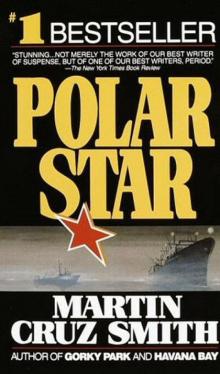 Polar Star
Polar Star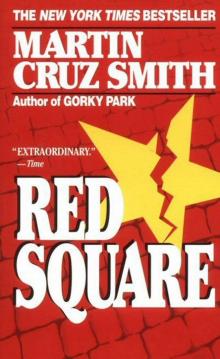 Red Square
Red Square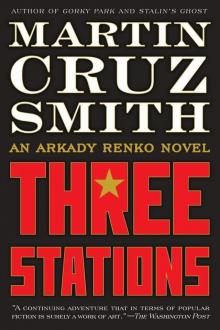 Three Stations
Three Stations Wolves Eat Dogs
Wolves Eat Dogs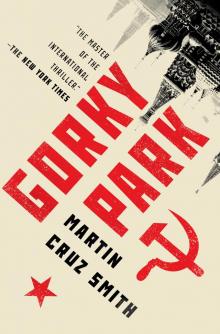 Gorky Park
Gorky Park December 6
December 6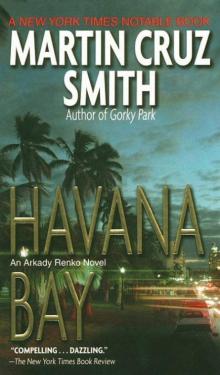 Havana Bay
Havana Bay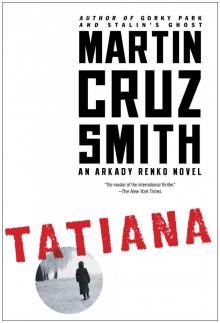 Tatiana
Tatiana The Girl From Venice
The Girl From Venice Stalin's Ghost
Stalin's Ghost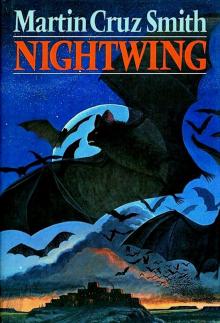 Nightwing
Nightwing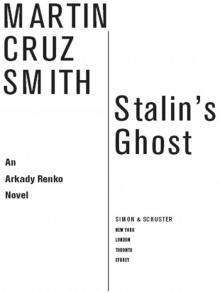 Stalin s Ghost
Stalin s Ghost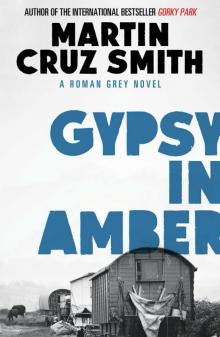 Gypsy in Amber
Gypsy in Amber Rose
Rose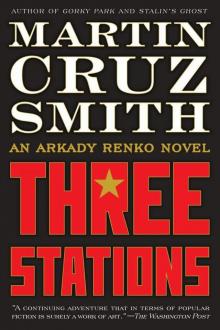 Three Stations: An Arkady Renko Novel
Three Stations: An Arkady Renko Novel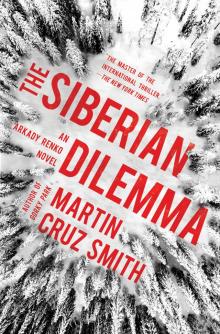 The Siberian Dilemma
The Siberian Dilemma December 6 (V5.0)
December 6 (V5.0)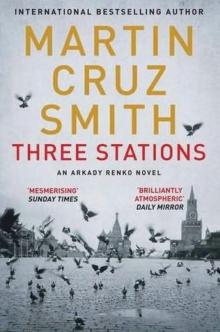 Three Stations ar-7
Three Stations ar-7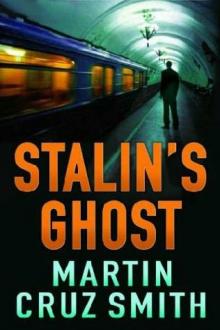 Stalin’s Ghost ar-6
Stalin’s Ghost ar-6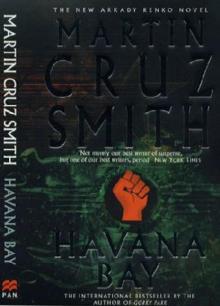 Havana Bay ar-4
Havana Bay ar-4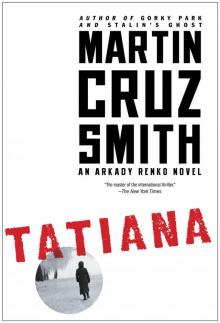 Tatiana ar-8
Tatiana ar-8